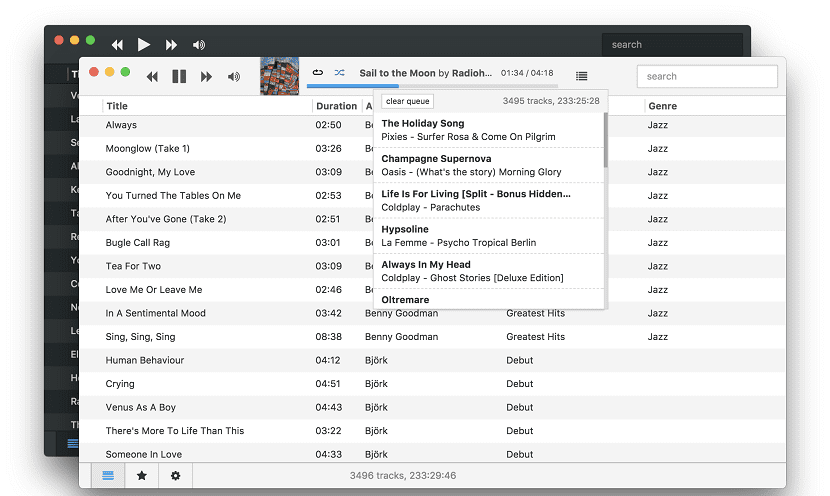
Si you are looking for a simple audio player that only has the basic functions that any audio player should have, I recommend you take a look at this player, which we are going to recommend.
Museeks is a lightweight, cross-platform music player (Linux, Mac OS and Windows) Museeks music player that uses Node.js as the back-end, electron for the built-in browser, and React.js as the front-end framework.
About the Museeks music player
museeks it is developed by a small team and its updates are not so frequent how one is going to wait.
It has support for playlists and its own media library which allows you to play audio files of only the most common formats: MP3, MP4, M4A / AAC, WAV, OGG, 3GPP.
The program allows them to perform a text search through the track library, allows the user to manually adjust the desired speed of music playback, is able to prevent the computer from going into sleep mode or turning off.
The player has improved performance, has support for dark themes and has a better search speed in relation to other simple players.
Between the main features that we can highlight of this player, we find the following:
- Elegant user interface: It has a consistent and well-designed user interface.
- Tray Applet: Music playback is controlled via a nicely designed tray applet.
- Desktop Notifications: Notifications are perfectly integrated with the desktop, so you can know what is playing even if the player is minimized.
- Theme support: If the light theme is too bright for your taste you can switch to the dark theme.
- Quick Search: Search for any of your tracks within the app and get a quick response.
- Drag and drop: Library management allows you to drag and drop files and folders directly onto the library settings page.
- Museeks also supports 32-bit and 64-bit computing architectures.

How to install Museeks music player on Ubuntu 18.04 LTS and derivatives?
Si you want to install this music player on your system, you can do it in the following way, following the instructions that we share below.
The first What we should do is go to the official website of the application and until the end of it we can find the download links. The link is this.
We can download the .deb or. AppImage of the application, you can download the package that you like the most.
Either of these two packages are valid for both Ubuntu and any derivative of it, as well as Debian and distributions based on it.
Currently the application is in its version 0.9.4, and we can download the packages as follows.
In the case of those who want to download the deb package, we must open a terminal and execute the following command in it for 64-bit systems:
wget https://github.com/KeitIG/museeks/releases/download/0.9.4/museeks-amd64.deb
While, for 32-bit systems, we must execute:
wget https://github.com/KeitIG/museeks/releases/download/0.9.4/museeks-i386.deb
E we install with the following command:
sudo dpkg -i museeks*.deb
In case of having problems with the dependencies, we just have to execute:
sudo apt -f install
Now for those who prefer the AppImage file for 64-bit systems, we only have to execute on the terminal:
wget https://github.com/KeitIG/museeks/releases/download/0.9.4/museeks-x86_64.AppImage -O museeks.AppImage
For 32-bit systems, just run:
wget https://github.com/KeitIG/museeks/releases/download/0.9.4/museeks-i386.AppImage -O museeks.AppImage
For install the AppImage file, first we must give execution permissions with:
sudo chmod a+x museeks.AppImage
And we execute with:
./museeks.AppImage
And that's it, they can start using the player on their systems.
How to uninstall Museeks from Ubuntu 18.04 LTS and derivatives?
Now if you want to remove this player from your systems, you just have to open the terminal and execute the following command in it:
sudo apt remove museeks*
If they downloaded the AppImage file, they just have to delete it.